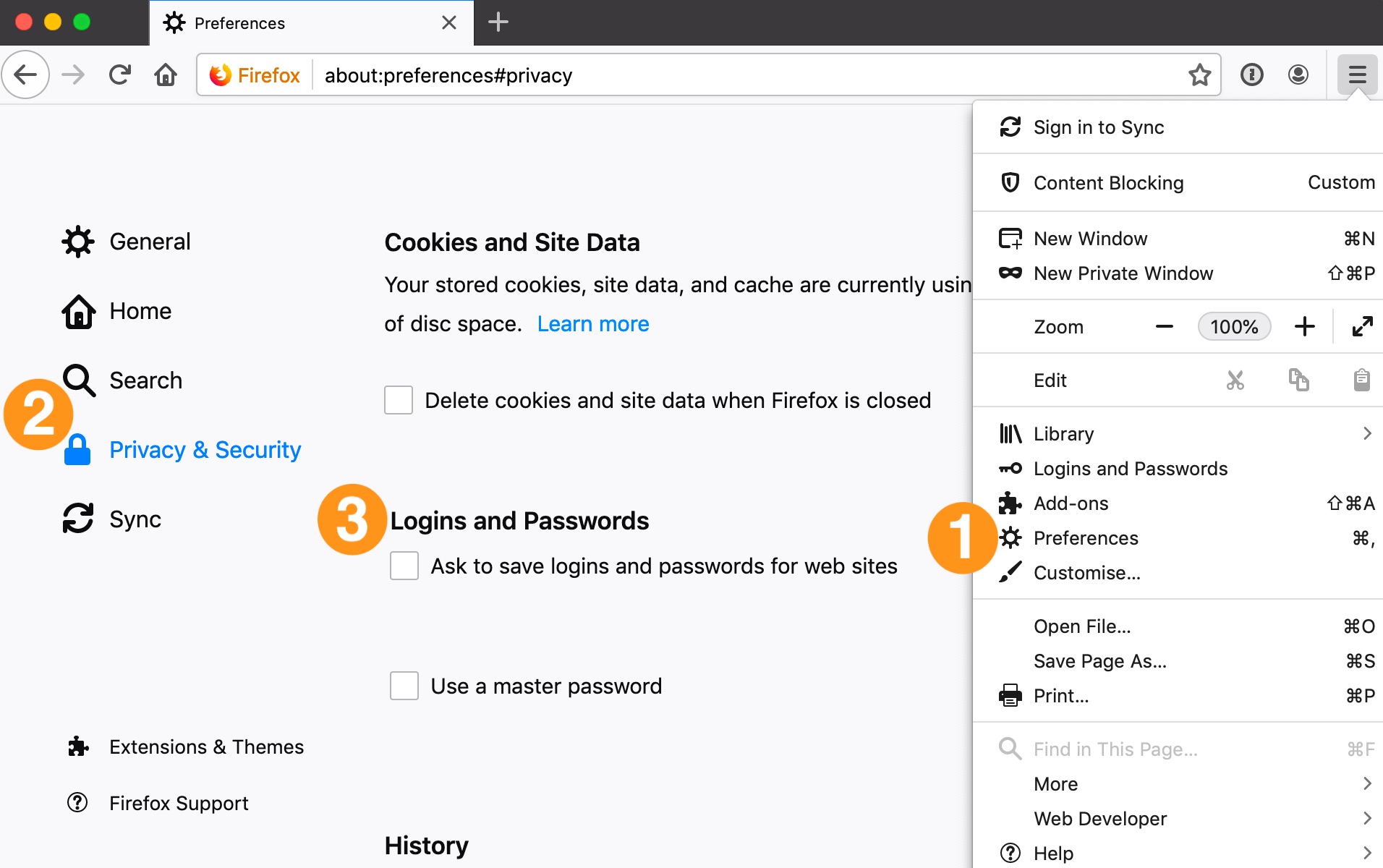Introduction
When it comes to browsing the web, security is a top priority for users. One crucial aspect of online security is the management of passwords. Firefox, one of the most popular web browsers, offers a built-in password manager that allows users to store and retrieve their login credentials for various websites. Understanding where Firefox stores these passwords is essential for both users and IT professionals who want to ensure the security and integrity of sensitive information.
In this article, we will delve into the intricacies of Firefox's password management system, shedding light on the specific locations where passwords are stored within the browser. By gaining insight into these storage mechanisms, users can better comprehend the security implications and potential vulnerabilities associated with their stored passwords. Additionally, IT professionals can leverage this knowledge to implement robust security measures and perform forensic investigations when necessary.
Let's embark on a journey through the inner workings of Firefox's password storage, uncovering the key databases and files that play a pivotal role in safeguarding and managing users' sensitive login information. By the end of this exploration, you will have a comprehensive understanding of where passwords are stored in Firefox, empowering you to make informed decisions regarding your online security practices.
Firefox Password Manager
The Firefox Password Manager is a built-in feature designed to simplify and secure the process of managing login credentials for various websites. It serves as a convenient repository for storing usernames and passwords, allowing users to auto-fill login forms and access their accounts with ease. This functionality not only enhances user experience but also plays a crucial role in promoting good password hygiene by encouraging the use of unique and complex passwords for different online accounts.
With the Firefox Password Manager, users can opt to save their login information when prompted by the browser. Once saved, these credentials are encrypted and stored within the browser's internal databases and files, ensuring that sensitive data remains protected from unauthorized access. Additionally, the password manager offers the option to generate and save strong, randomized passwords for new accounts, further bolstering security measures.
Furthermore, the Firefox Password Manager provides users with the ability to view, edit, and delete their saved login credentials. This level of control empowers users to manage their stored passwords effectively, enabling them to update or remove outdated or compromised credentials as needed. Moreover, the password manager integrates seamlessly with Firefox's sync feature, allowing users to synchronize their saved passwords across multiple devices, thereby ensuring a consistent and secure browsing experience across platforms.
In essence, the Firefox Password Manager serves as a fundamental component of the browser's security infrastructure, offering users a convenient and secure means of managing their login credentials. By understanding the inner workings of this password management system, users can make informed decisions about their online security practices, ultimately contributing to a safer and more secure browsing experience.
Key3.db and Logins.json
In the realm of Firefox's password storage, two key components play a pivotal role in safeguarding users' login credentials: Key3.db and Logins.json. These elements are integral to the encryption and storage of sensitive data within the browser, providing a secure foundation for managing and retrieving passwords.
Key3.db
Key3.db is a critical component of Firefox's password storage mechanism, serving as the key database for encrypting and decrypting the login credentials stored within the browser. This database is responsible for managing the encryption keys that are utilized to secure the sensitive information stored in Logins.json. By leveraging robust encryption algorithms, Key3.db ensures that users' passwords are protected from unauthorized access and potential security threats.
Logins.json
Complementing the functionality of Key3.db, Logins.json is a vital file that houses the encrypted login credentials saved by users within Firefox. This JSON file stores a wealth of information, including website URLs, usernames, and encrypted passwords, all of which are securely protected through the encryption keys managed by Key3.db. The structured format of Logins.json enables Firefox to efficiently retrieve and populate login forms when users revisit websites, streamlining the authentication process while upholding stringent security measures.
By understanding the roles of Key3.db and Logins.json, users and IT professionals gain valuable insight into the inner workings of Firefox's password storage system. This knowledge not only fosters a deeper understanding of the security measures in place but also empowers individuals to make informed decisions regarding their online security practices. Additionally, IT professionals can leverage this understanding to implement robust security protocols and conduct forensic analyses when necessary, further fortifying the integrity of stored passwords within Firefox.
In essence, Key3.db and Logins.json form the backbone of Firefox's password storage infrastructure, working in tandem to ensure the secure encryption and retrieval of users' login credentials. By delving into the intricacies of these components, users and IT professionals alike can navigate the landscape of password security with confidence, ultimately contributing to a safer and more secure browsing experience within the Firefox ecosystem.
Signons.sqlite
Signons.sqlite is a crucial component of Firefox's password storage infrastructure, playing a pivotal role in securely housing and managing users' login credentials. This SQLite database serves as a repository for storing encrypted login information, including website URLs, usernames, and corresponding passwords. By leveraging the structured format and robust encryption mechanisms inherent to SQLite, Signons.sqlite ensures that sensitive data remains safeguarded from unauthorized access and potential security threats.
Within Signons.sqlite, each stored login credential is encapsulated within a structured schema, enabling Firefox to efficiently retrieve and manage this information when users interact with login forms on various websites. The database's design facilitates seamless integration with the browser's password management functionality, allowing users to access their stored credentials and auto-fill login forms with ease. This streamlined process not only enhances user experience but also promotes good password hygiene by encouraging the use of unique and complex passwords for different online accounts.
Moreover, Signons.sqlite operates in conjunction with other key components, such as Key3.db and Logins.json, to ensure the comprehensive encryption and storage of users' login credentials. The synchronization of these elements within Firefox's password storage ecosystem establishes a robust foundation for protecting sensitive information, thereby contributing to a secure browsing experience for users.
From a forensic standpoint, Signons.sqlite holds significant value for IT professionals and security experts. In the event of security incidents or forensic investigations, the structured nature of this database enables experts to analyze and extract valuable insights regarding stored login credentials. This capability empowers IT professionals to conduct thorough assessments of password security within Firefox, facilitating the implementation of targeted security measures and the mitigation of potential vulnerabilities.
By comprehending the role of Signons.sqlite within Firefox's password storage framework, users and IT professionals alike gain a deeper understanding of the security measures in place. This knowledge not only fosters informed decision-making regarding online security practices but also empowers individuals to navigate the landscape of password security with confidence. Ultimately, Signons.sqlite stands as a cornerstone of Firefox's password storage infrastructure, upholding the integrity and security of users' login credentials within the browser's ecosystem.
Other Locations
In addition to the key databases and files discussed earlier, Firefox utilizes other locations to store and manage various aspects of users' browsing data, including login credentials and related information. These additional locations play a significant role in the comprehensive storage and retrieval of sensitive data within the browser's ecosystem.
Preferences
Firefox maintains a range of preferences that encompass user-specific settings, including those related to password management. These preferences are stored within the browser's configuration files, such as prefs.js and user.js. While not directly housing login credentials, these files contain essential configurations that influence the behavior of the password manager and its interaction with stored credentials. Understanding and managing these preferences is crucial for ensuring the effective and secure operation of the password management system within Firefox.
Session Restore
The Session Restore feature in Firefox is responsible for preserving users' browsing sessions, including open tabs and their respective state. While not a primary location for storing login credentials, the Session Restore functionality indirectly impacts the management of stored passwords. In the event of a browser crash or unexpected closure, Session Restore plays a vital role in restoring users' active sessions, including any authenticated states on websites. This feature indirectly contributes to the overall user experience and the seamless management of login credentials within Firefox.
Web Storage
Web storage, including localStorage and sessionStorage, is utilized by websites to store data locally within the user's browser. While not directly controlled by Firefox, the data stored in web storage can include user authentication tokens and related information. Understanding the implications of web storage on the security and management of login credentials is essential, as it pertains to the broader landscape of password security within the browsing environment.
Add-Ons and Extensions
Firefox's extensible nature allows users to install add-ons and extensions that enhance the browser's functionality. Some of these add-ons may interact with the password manager or access stored login credentials for specific purposes, such as password management utilities or security enhancements. It is imperative for users to exercise caution when granting permissions to add-ons that request access to their stored passwords, as this interaction can impact the security and integrity of sensitive login information.
By acknowledging the significance of these additional locations within Firefox's password storage ecosystem, users and IT professionals can gain a holistic understanding of the broader landscape of password security within the browser. This comprehensive awareness empowers individuals to make informed decisions regarding their online security practices and enables IT professionals to implement targeted security measures to safeguard users' sensitive data effectively.
Conclusion
In conclusion, the intricate web of Firefox's password storage system encompasses a diverse array of components, each playing a crucial role in safeguarding and managing users' login credentials. From the foundational encryption mechanisms managed by Key3.db to the structured storage of encrypted login information within Logins.json and Signons.sqlite, Firefox's password storage infrastructure stands as a testament to the browser's commitment to security and user privacy.
By unraveling the inner workings of Firefox's password storage, users and IT professionals gain valuable insights into the robust security measures in place, empowering them to navigate the digital landscape with confidence. The Firefox Password Manager, with its seamless integration and synchronization across devices, not only enhances user experience but also promotes good password hygiene, fostering a culture of strong and unique passwords for online accounts.
Furthermore, the exploration of additional locations, such as preferences, session restore, web storage, and add-ons, sheds light on the broader implications of password security within the Firefox ecosystem. Understanding these facets is essential for users and IT professionals to fortify the integrity of stored passwords and mitigate potential vulnerabilities effectively.
As the digital realm continues to evolve, the significance of password security cannot be overstated. With the knowledge gained from this exploration, users are empowered to make informed decisions regarding their online security practices, contributing to a safer and more secure browsing experience within the Firefox environment. Similarly, IT professionals can leverage this understanding to implement targeted security measures and conduct forensic analyses, bolstering the overall resilience of Firefox's password storage infrastructure.
In essence, the journey through Firefox's password storage has unveiled a multifaceted landscape, where encryption, structured databases, and additional storage locations converge to uphold the security and integrity of users' login credentials. By embracing this knowledge, individuals and organizations alike can navigate the digital realm with confidence, knowing that their sensitive data is safeguarded within the robust confines of Firefox's password storage ecosystem.

























